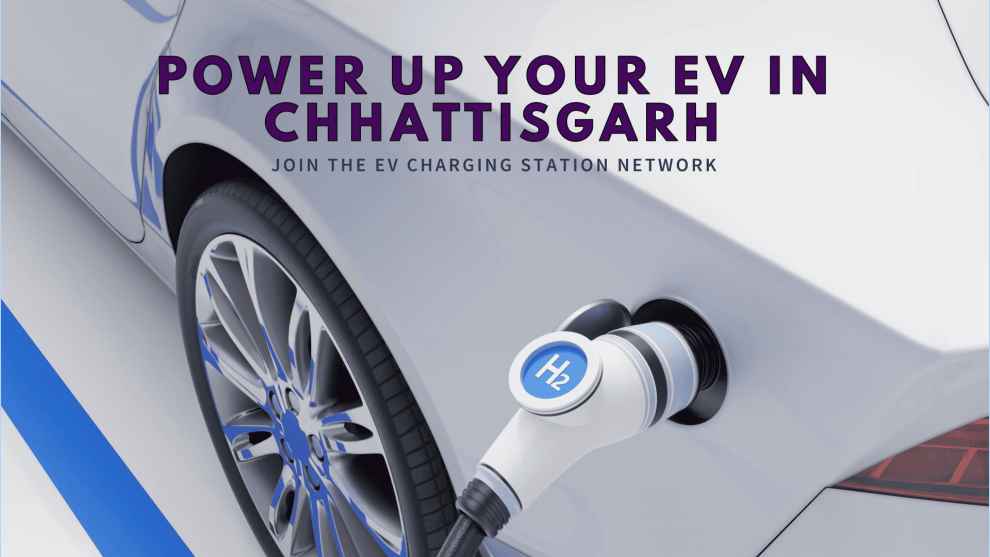The global push toward sustainable transportation has spurred the rapid adoption of electric vehicles (EVs). In India, states like Chhattisgarh are embracing this transition by promoting EV adoption and developing the necessary infrastructure. With the central and state governments offering incentives, the business opportunity for setting up EV charging station networks in Chhattisgarh is immense.
Why Chhattisgarh is Ideal for EV Charging Business
1. Strategic Location
Chhattisgarh is centrally located, serving as a key transit hub for neighboring states like Maharashtra, Madhya Pradesh, and Odisha. Its growing highway network is ideal for inter-city EV charging infrastructure.
2. Rising Urbanization
Cities like Raipur, Bhilai, and Durg are experiencing rapid urbanization and an increase in vehicle ownership, paving the way for EV adoption.
3. Government Support
Chhattisgarh’s EV Policy 2022 emphasizes developing EV infrastructure, offering subsidies for setting up charging stations and encouraging private sector participation.
4. Industrial and Renewable Energy Hub
The state’s robust industrial ecosystem and focus on renewable energy make it ideal for setting up energy-efficient and cost-effective charging solutions.
Types of EV Charging Stations
- Home Chargers: Installed at residential premises for private EV owners.
- Public Chargers: Located in malls, offices, parking lots, and highways for public use.
- Fast Chargers: Provide high-speed charging, usually at strategic locations like highways and fuel stations.
Setting Up an EV Charging Station Network in Chhattisgarh
1. Business Models
- Franchise Model: Partner with established EV charging networks.
- Stand-Alone Business: Set up independent charging stations.
- Public-Private Partnerships (PPP): Collaborate with local government bodies.
2. Infrastructure Requirements
- Location Selection: Choose high-traffic areas like highways, commercial zones, and residential clusters.
- Power Supply: Ensure access to stable and high-capacity electricity connections.
- Charging Equipment: Install chargers based on the type of vehicles catered to (two-wheelers, cars, buses).
3. Costs Involved
- Land or Space Lease: Depends on the location and area required.
- Equipment Cost: Ranges from ₹1 lakh to ₹10 lakh per charger depending on capacity (AC or DC).
- Installation and Maintenance: Includes civil work, wiring, and periodic servicing.
Licensing and Permits
- Electricity Distribution Approval: Obtain permission from the Chhattisgarh State Power Distribution Company Limited (CSPDCL).
- Safety Compliance: Adhere to Central Electricity Authority (CEA) norms for EV charging infrastructure.
- Local Municipality Clearance: For land use and zoning compliance.
Revenue Streams
- Charging Fees: Revenue from electricity consumed by EV owners.
- Advertising: Generate income by placing digital or static ads at charging stations.
- Subscription Plans: Offer discounted packages for regular users.
- Battery Swapping Services: Cater to two-wheelers and three-wheelers with fast battery replacement options.
Challenges in EV Charging Business
1. High Initial Investment
Setting up EV charging infrastructure requires significant capital for equipment and installation.
2. Power Supply Issues
Ensuring consistent and high-capacity electricity supply can be challenging in remote areas.
3. Limited EV Adoption
While growing, the number of EVs in Chhattisgarh is still relatively low, leading to longer breakeven periods.
4. Technical Compatibility
Different EV models have varying charging requirements, necessitating universal compatibility.
Government Initiatives Supporting EV Infrastructure in Chhattisgarh
- Subsidies and Incentives
Under the state EV policy, businesses can avail subsidies on charging station equipment and installations. - Land Allocation
The government is facilitating land allotment in industrial and commercial zones for EV infrastructure. - FAME-II Scheme
The central government’s Faster Adoption and Manufacturing of Electric Vehicles (FAME-II) scheme offers incentives for EV infrastructure development.
Future Potential of EV Charging Network Business
The demand for EV charging stations is expected to rise significantly in Chhattisgarh as:
- EV penetration increases due to falling vehicle costs and government incentives.
- Public awareness of sustainability grows, leading to a shift toward green mobility.
- Businesses and fleet operators (e.g., cab services, logistics firms) adopt EVs to reduce operational costs.
Strategic collaborations with renewable energy providers and technology firms can further enhance the profitability and sustainability of EV charging networks.
Chhattisgarh’s emerging EV ecosystem presents a lucrative opportunity for entrepreneurs and investors in the EV charging station business. By leveraging government support, adopting innovative business models, and addressing the state’s unique challenges, businesses can play a pivotal role in building a robust and sustainable EV infrastructure. The EV charging network not only supports the green revolution but also positions Chhattisgarh as a key player in India’s journey toward sustainable transportation.
More about Fast Charging Stations
Fast Chargers: The Backbone of High-Speed EV Charging
Fast chargers are designed to deliver higher power outputs compared to standard chargers, enabling electric vehicles (EVs) to recharge their batteries in a significantly shorter time. These chargers are crucial for ensuring convenience and efficiency for EV users, particularly in scenarios where time is a critical factor.
Key Features of Fast Chargers
- High Power Output:
- Typically ranges from 50 kW to 350 kW, depending on the charger type and vehicle compatibility.
- Capable of charging a standard EV battery from 20% to 80% within 15–45 minutes.
- DC Charging Technology:
- Most fast chargers use Direct Current (DC) technology, bypassing the vehicle’s onboard charger to feed power directly to the battery.
- This method ensures higher efficiency and faster charging times.
- Compatibility with CCS and CHAdeMO Standards:
- Fast chargers are compatible with popular charging standards like Combined Charging System (CCS) and CHAdeMO, ensuring usability across a wide range of EV models.
- Real-Time Monitoring and Smart Features:
- Equipped with IoT-enabled systems for real-time monitoring, payment integration, and user notifications.
- Some models support scheduling, allowing users to book charging slots in advance.
Strategic Placement of Fast Chargers
Fast chargers are typically installed at high-traffic locations to maximize accessibility and convenience for EV users.
- Highways and Expressways:
- Enables long-distance travel for EV owners, reducing range anxiety.
- Positioned approximately every 50–100 kilometers to ensure uninterrupted travel for long-range EVs.
- Fuel Stations:
- Integrated with traditional fuel stations to provide dual options for users.
- Ideal for users transitioning from Internal Combustion Engine (ICE) vehicles to EVs.
- Urban Centers and Commercial Zones:
- Found in busy areas like malls, office complexes, and multi-level parking facilities.
- Targets EV owners who need quick top-ups during shopping or work hours.
- Fleet Depots:
- Dedicated fast chargers for logistics and transportation fleets, ensuring operational efficiency for electric buses, taxis, and delivery vehicles.
Advantages of Fast Chargers
- Time Efficiency:
- Significantly reduces downtime for EV owners compared to slow or standard chargers.
- Convenience:
- Ideal for drivers who need a quick recharge during trips or daily commutes.
- Boosts EV Adoption:
- Alleviates range anxiety, encouraging more people to switch to electric vehicles.
- Revenue Potential:
- High turnover rates at fast-charging stations can lead to greater profitability for operators.
- Supports Heavy-Duty EVs:
- Critical for charging larger vehicles like buses and trucks, which require higher energy inputs.
Challenges and Considerations
- High Initial Investment:
- The cost of setting up a fast charger, including equipment and installation, can range from ₹10 lakhs to ₹50 lakhs per unit.
- Energy Demand:
- Requires high-capacity electricity connections, which may not be readily available in remote areas.
- Battery Life Concerns:
- Frequent use of fast chargers can accelerate battery degradation in some EVs.
- Maintenance and Upgrades:
- Regular maintenance is essential to ensure consistent performance. Upgrades may be required as EV battery technology evolves.
Future of Fast Charging Technology
- Ultra-Fast Charging:
- Chargers with power outputs exceeding 500 kW are under development, capable of recharging EVs in under 10 minutes.
- Wireless Fast Charging:
- Wireless systems using inductive charging technology may soon offer high-speed charging without the need for physical connectors.
- Renewable Energy Integration:
- Solar-powered fast charging stations are being developed to reduce reliance on grid electricity and promote sustainability.
- Battery-Swapping Integration:
- Fast chargers may be paired with battery-swapping stations to serve diverse customer preferences.
Fast chargers are pivotal for building a comprehensive EV charging station network in Chhattisgarh, addressing the needs of urban commuters, long-distance travelers, and commercial fleet operators. By strategically deploying these chargers across key locations, businesses and policymakers can accelerate the transition to green mobility and ensure a seamless EV experience for users.
For more information or services related to MSMEs in Chhattisgarh:
📧 Email Us:
contact@entrepreneur.org.in
sharma.maayank@yahoo.com
📞 Call Us:
+91 97551 29633
🌐 Visit Us for Updates:
BharatiyaMedia.com
We’re here to support your entrepreneurial journey!












Add Comment